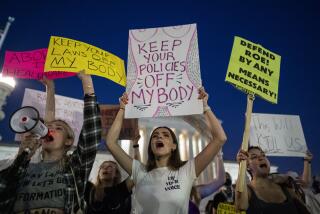Beyond Women’s Suffrage
- Share via
“Equality of the sexes,” predicted abolitionist and feminist Sarah M. Grimke in 1837, would bring “benefits to men, as well as women. Men . . . would find that woman, as their equal, was unspeakably more valuable than woman as their inferior, both as a moral and an intellectual being.”
Eighty-three years later, on Aug. 26, 1920, the 19th Amendment to the Constitution was adopted, extending to women an enormous measure of equality in the right to vote. Today, on Women’s Equality Day, we celebrate the 71st anniversary of the Suffrage Amendment. And while there has been much progress in recent decades, there is still precious little equality for many American women.
Grimke criticized some of her wealthier contemporaries for being “supported in idleness and extravagance, by the industry of their husbands.” But where Grimke envisioned that women who began to take “their responsibility, for the support of themselves, or their families” would “add strength and dignity to their characters,” they have, too often, also experienced job discrimination, lower pay and sexual harassment.
Half the American population is female, yet women are still only 5% of all members of Congress, less than 3% of the top executives at major corporations and 20% of all physicians. In 1989, women still earned only 68 cents for every dollar earned by men--and this is an all-time high. There are more women than men below the U.S. Census Bureau’s poverty line and women still sometimes lose their jobs when they have babies.
Nonetheless, there have been astonishing improvements in women’s lives in recent decades. More women now graduate college than men. There are many more options for women professionally and politically than ever before. And while women are not a monolithic voting block, they are an increasingly powerful political force.
But prejudice and skepticism remains. Some still question whether women can be or should be both parents and committed workers, or whether women can or should be police officers, despite their record of performance.
Sarah Grimke thought that the benefits of women’s equality would be self-evident to men and women. It has been our nation’s loss that, so far, she has been wrong.
More to Read
Get the L.A. Times Politics newsletter
Deeply reported insights into legislation, politics and policy from Sacramento, Washington and beyond. In your inbox twice per week.
You may occasionally receive promotional content from the Los Angeles Times.







